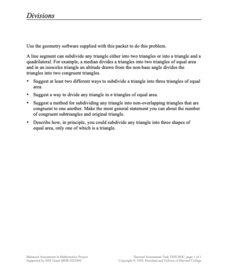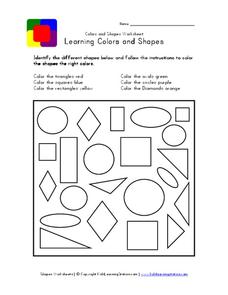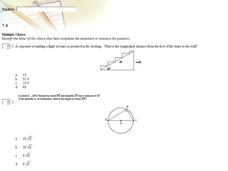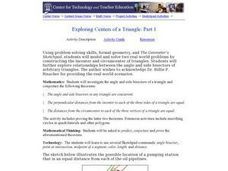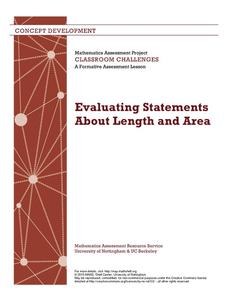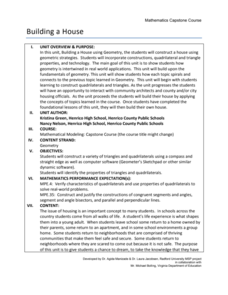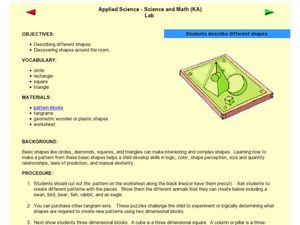Concord Consortium
Divisions
Divide and conquer the geometry problem. Young scholars consider how to subdivide triangles into smaller ones that have equal areas. They must apply their knowledge of medians to help accomplish the task.
Geometry Accelerated
Coordinate Geometry Additional Practice
Your learners get extra practice using coordinates in calculating mid points, finding end points, deciding if points are collinear, calculations using slope concepts, writing linear equations, using triangles and quadrilaterals, and...
Buffalo State
A Five Day Approach to Using Technology and Manipulatives to Explore Area and Perimeter
Young mathematicians build an understanding of area and perimeter with their own two hands in a series of interactive geometry lessons. Through the use of different math manipulatives, children investigate the properties of...
Curated OER
Geometric Shapes
Connect geometric shapes to your learners' lives with this worksheet. In order to complete this worksheet, young scholars must discover examples of triangles, squares, and circles at school, at home, and outdoors and list them on a...
Curated OER
Travel Triangles
Students demonstrate and understanding of the three types of angles using triangles and quadrilaterals. In this angles lesson plan, students learn about acute, obtuse and right angles. They use cut-outs to find the areas of triangles and...
Curated OER
Quandaries, Quagmires, and Quadrilaterals
Students classify, flip, slide, and turn a quantity of quadrilaterals.
Math Mammoth
Finding the Area of Rectangles, Parallelograms, and Triangles
For this area of polygons activity, 9th graders solve two area of rectangles, one area of parallelogram, and ten area of triangles problems. The formulas for finding the area of these figures are provided.
Curated OER
Learning Colors and Shapes
In this colors and shapes worksheet, students look over a box full of different shapes, color the triangles red, squares blue, rectangles yellow, ovals green, circles purple and the diamonds orange.
Curated OER
Tri this Angle!
First graders draw and describe various types of polygons. they investigate their own environments for examples of polygons. After reading the book, The Greedy Triangle, they discuss everyday objects that are polygons. They create shape...
Curated OER
Does the Area of the Quadrilateral Change?
Seventh graders complete activities to further their understanding of area formulas. In this area lesson plan, 7th graders watch as the teacher uses Polystrips to model parallelograms. Students find the area of a rectangle and answer...
Curated OER
Anticipation/Reaction Guides and Discussion Groups
Seventh graders study geometric shapes around the classroom. In this geometry lesson plan, 7th graders discuss their answers in groups to the Anticipation/Reaction guide handout. Students complete the reaction side of the guide and...
Curated OER
Classify and Identify Polygons
In this polygon worksheet, students observe pictures of polygons and identify their proper name. They read descriptions of polygons and determine the polygon described. This one-page worksheet contains ten problems.
Curated OER
Special Right Triangles Multiple Choice
For this length worksheet, students answer five multiple choice questions concerning lengths using rules of various figures including, triangles, rhombus, diamonds, and circles.
Curated OER
Quadrilaterals and Other Polygons
In this quadrilaterals and other polygons worksheet, students name various polygons and then decide if each polygon is a quadrilateral. Students also decide is certain polygons regular or irregular.
Curated OER
Exploring Centers of a Triangle: Part 1
Pupils use problem solving skills, formal geometry, and The Geometer?s Sketchpad. They model and solve two real-world problems by constructing the in center and circumcenter of triangles.
Curated OER
Squares and Triangles
In this squares and triangles worksheet, students trace five triangles and six squares, cut out each one and then place them together to make a variety of shapes.
Curated OER
Exploring Geometric Figures
Tenth graders explore mathematics by participating in hands-on daily activities. Learners identify a list of different shapes and classify them by shape, size, sides and vertices. They utilize tangrams and geometric pieces to gain...
Curated OER
Polygons
This resource provides 5 different worksheets on the topic of polygons and symmetry. These worksheets cover rotational symmetry, lines of symmetry, symmetry of regular polygons, special quadiralaterals, and polygon transformation. The...
Curated OER
Guess the Shape
How well does your class know their shapes? This interactive shape quiz provides learners with four clues which they will use to determine identify each shape. This is an excellent way to assess how well learners know their shapes and...
Mathematics Assessment Project
Evaluating Statements About Length and Area
Class members complete an assessment task by identifying whether statements about triangles and quadrilaterals are always true, sometimes true, or never true. They then participate in a sorting activity with the same objective.
Radford University
Building a House
Ever dream of becoming an architect? Here's your chance to give it a try. After reviewing facts about triangles and quadrilaterals, pupils learn about the basics of architecture by talking to an architect or housing expert. They use...
Illustrative Mathematics
Area of a Trapezoid
Here is a straightforward example of how to apply the Pythagorean Theorem to find an unknown side-length of a trapezoid. Commentary gives additional information on proving that the inside of the trapezoid is a rectangle, but is...
Curated OER
Shapes and Tools
Young learners view different shapes drawn by the teacher on the board. The teacher identifies each shape by name and discusses the importance of knowing the difference between shapes when building something. The pupils complete the...
Curated OER
Applied Science - Science and Math (K) Lab
In this shape instructional activity, learners cut out tangram shapes and create different pictures with them. They look at 3-D shapes as well. There is a nice, hands-on component built into this instructional activity.
